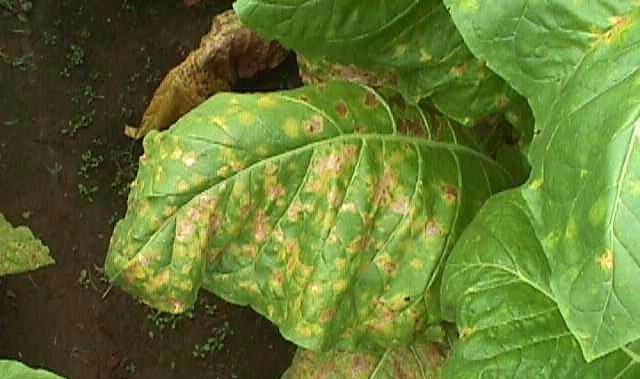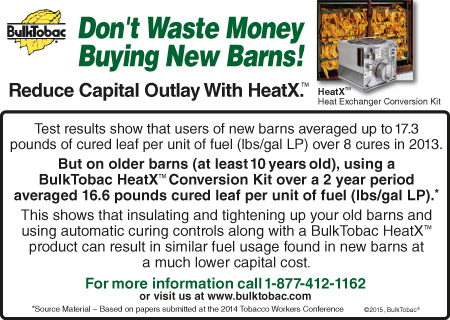In my last issue, I reported the opinion of the leader of US Tobacco Cooperative that auctions are contributing to the problem of oversupply of leaf; the response of warehouseman Dennis White of Rural Hall, N.C.; and my own opinion that warehouses are a more desirable marketing method than anything that might rise up in their place. I asked for other opinions, and I definitely got them. Following are the first responses I received. If you want to weigh in with further thoughts, I will print them in a future issue. Email direct to this address: chrisbickers@gmail.com. Write Auctions in the heading. The original items appear at the end of this section. And after that there is a short update on several new outbreaks of blue mold that I have become aware. Look for my next issue around the first of August.--Chris Bickers
Strongly disagree [with editor Bickers].
Charlie S. Batten, N.C.
[I] just read your thoughts on the auctions, [and I] cannot follow your thinking! There about eight end users of flue-cured tobacco. The contractors are receiving tobacco that should be graded for a price, say $2.10, [which] they reject by grading to a lesser price. The farmer takes the bale to auction and receives an offer of $1.50. What is he to do? He sells to warehouse...The warehouse sells the bale, direct or indirect, to the same company after everyone involved gets their cut. Everyone wins except the grower! The situation is even worse with wildcat tobacco that is covered with crop insurance! Wake up!
Kendall Hill, N.C.
I agree with you [that] auctions remain a needed portion of our tobacco leaf sales system. There will always be some leaf falling below contract standards but [that is] usable in lesser brands. Many people don't realize our major buyers are pointing those contract purchases to manufacturing premium brands here and globally. The cheaper off-quality leaf can be nearly a substitute for the imported strips from Africa, India and some Asian countries. A far more important issue is the acres produced with the RMA subsidized crop insurance as the underlying revenue guarantee and subsequent flow of those dollars. Despite some feeble attempts to reform the most offending portions of that system, the pounds from both burley and flue continue to increase going through the quality grading program. Only when the insurance reform discussions are being lead by non-conflicted growers will we see improvements in the abuse of the crop insurance area.
Roger Quarles, Ky.
(Note: In an earlier edition, this letter was mistakenly attributed to Roger Quarles' son, Ryan Quarles, Commissioner of Agriculture of the Commonwealth of Kentucky.)
I may regret these words, but if a farmer [has] contract pounds, he or she should not be able to insure it. Insurance is what is supporting wildcat tobacco and that only hurts the whole tobacco industry.
Brad Barefoot, N.C.
Here is the editor's original opinion: The danger of oversupply comes not so much from tobacco sold beyond what is contracted, but from tobacco sold beyond what is contracted that no one knows about. The auctions offer at least a framework for transparency. I consider them--and have considered them from the time the new ones started springing up--to be a positive addition to our marketing system. I wish we had more of them (TFN July II 2016).
UPDATE ON BLUE MOLD
--Pennsylvania: Blue mold was found growing in several tobacco fields in the Christiana area of eastern Lancaster County two weeks ago. It has since been found at low levels in other areas as well. At this point, the incidences don't appear to be cause for much concern. "With the recent hot dry weather, it should not spread very quickly," says Jeff Graybill, Pennsylvania agronomy Extension educator. "But fields should continue to be closely monitored, and in many cases a protective spray should beapplied." It was found on burley. "But I would imagine that in some cases, fields of the other types--especially PA type 41 wrapper tobacco--should be sprayed," he says.
--Virginia: "We know of three cases of blue mold in central Virginia, all within 20 miles," says Chuck Johnson, Virginia Extension plant pathologist. "Hopefully, we'll not see any more. But we're watching. Many fields are at or are approaching topping, at which point leaves become less susceptible as they thicken and ripen."
--Tennessee: Blue mold was found in Carter County, Tn., in the northeast part of the state bordering North Carolina, on July 2, according to Melody Rose, Tennessee Extension agent in nearby Greene County. "That was actually during a dry spell when you don't expect blue mold," she says. Since then, a few spots have appeared here and there, usually in shady areas or by rivers. None appear threatening now, Rose believes, but topping is still a way off in east Tennessee.
DATES TO REMEMBER
- July 21. Tennessee Tobacco Tour, AgResearch Education Ctr., Greeneville, Tn. Registration and a trade show start at 3 p.m. Tours start at 3:30 p.m. and 5:30 p.m. with a sponsored dinner at 7 p.m. Contact: 423-638-6532.
- July 25-27. N.C. Tobacco Tour. Welcome reception begins at 6 p.m., Kings BBQ, Kinston, N.C., July 25. Tours begin July 26 at 8 a.m. (breakfast at 7:30 a.m.) at the Cunningham Research Station in Kinston and on July 27 at the Upper Coastal Plain Research Station in Rocky Mount at 8 a.m. (breakfast at 7:30 a.m.). Farm visits both days in the afternoon. The tour will end in Oxford around 5 p.m. To register, go to tobacco.ces.ncsu.edu.
- July 28. Corn, Soybean and Tobacco Field Day, University of Kentucky Research & Education Center, Princeton. Registration begins at 7 a.m. and tours run from 8 a.m. until noon. Sponsored lunch. Contact: Andy Bailey at 270-365-7541 Extn. 240.
- August 2. Annual Tobacco Research Field Day. Southern Piedmont AREC, Blackstone, Va. Registration begins at 5 p.m., followed by dinner. Tour will begin at 6 p.m. Contact: Margaret Kenny at 434-292-5331 or makenny@vt.edu.
- August 11. Tobacco Twilight Tour, Murray State University, Murray, Ky. Registration beginning at 5:30 p.m., followed by field tour and supper. Contact: Andy Bailey at andybailey@uky.edu or 270-365-7541 Extn. 240.
- August 8-9. Burley Tobacco Research Tour in Central Ky. August 8: Begins at the Plant and Soil Sciences Field Lab., 3250 Ironworks Pike, Lexington Ky., at 1 p.m. Dinner at 5:30. August 9: 8 a.m.-2 p.m. tour of test plots on grower farms in surrounding counties. Contact: Bob Pearce at 859-257-5110.


 there is no resistance at all in dark tobacco."
there is no resistance at all in dark tobacco."



